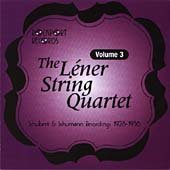| All Artists: Franz Schubert, Robert Schumann, Lener string quartet, Audrey Brain, Charles Draper, Ernest Hincliff, Claude Hobday Title: The Lener String Quartet Vol.3 : Schubert Octet, Schumann 3rd Quartet, Recorded 1928 & 1936 Members Wishing: 0 Total Copies: 0 Label: Rockport Release Date: 5/23/2000 Album Type: Original recording remastered, Import Genre: Classical Style: Symphonies Number of Discs: 1 SwapaCD Credits: 1 UPC: 072911500825 |
Search - Franz Schubert, Robert Schumann, Lener string quartet :: The Lener String Quartet Vol.3 : Schubert Octet, Schumann 3rd Quartet, Recorded 1928 & 1936
 | Franz Schubert, Robert Schumann, Lener string quartet The Lener String Quartet Vol.3 : Schubert Octet, Schumann 3rd Quartet, Recorded 1928 & 1936 Genre: Classical |
Larger Image |
CD Details |
CD ReviewsTwo significant historical documents and an affecting Schube Discophage | France | 11/29/2006 (4 out of 5 stars) "Amazon's information is puzzling here, as the label is actually Rockport classics, and this was the third instalment of what was announced to be part of a long term project to reissue the complete recordings of the Léner Quartet. It was back in 1999 and the project does not seem to have progressed much since. Is Rockport still in business? A pity if not.
Volume 3 pairs what I believe was the first recording of Schubert's Octet, made in 1928 with partners including the famous hornist Audrey Brain, and a 1936 recording of Schumann's third string quartet. I've reviewed the disc at length under its other listing on Amazon.com. Search "Schubert Octet Lener" and you should find it. The transfers are excellent: clear and bright sound, good instrumental definition and minimal surface noise (at least in the Schubert). Interpretively, despite some decidedly old-fashioned stylistic phrasings, rubatos and portamenti and a few spots of shabby ensemble playing, the Octet has held up well, with lively and zestful fast movements (1, 3, 5 and 6), fine dramatic tension in the "Adagio" (2nd movement) and a genial and easy going, but architecturally cogent theme and variations (4th movement). In sum, this first recording left room - Gott sei Dank! - for instrumental improvement and interpretive enrichment, but as it is, it remains an entirely valid view, full of unique interpretive insights, indispensable for anyone interested in the piece's performance history. In Schumann, I find all those stylistic traits of a bygone era more perturbing, with wailing tone from violin and cello and tempos in the outer movement that are slow to the point of plodding, making Schumann's obsessive dotted rhythms in the finale seem square and boringly repetitive. Still in that same finale the Léners display a commendable concern for architectural coherence, and the two inside movements fare better, with in particular an "Adagio molto" (third movement) of moving restraint and intense lyricism. The Schubert Octet can also be found in a convenient box Andante 4 CD-box of famous historical interpretations of Schubert's chamber music, that might however entail some duplication, but as far as I know this is the only CD reissue of the Schumann. " |
